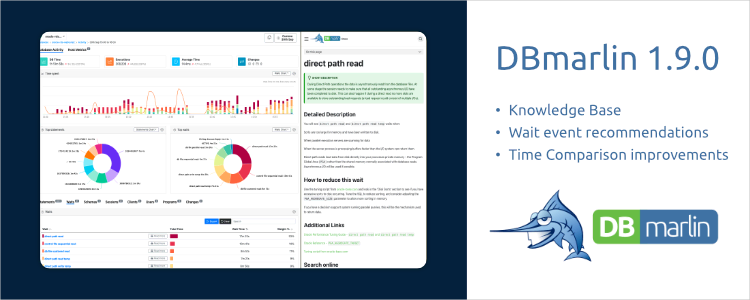DBmarlin 1.9.0 released - with Knowledge Base and wait event recommendations

Version 1.9 of DBmarlin brings the ability to quickly understand database wait events, what they mean and what can be done to reduce them.
DBmarlin now includes descriptions of database wait events and actionable steps to reduce the time spent waiting for a particular event, in our new Knowledge Base.
We have also improved the Time Comparison report based on user feedback, making it easier to compare database performance before and after any changes.
Knowledge Base of wait events and tuning recommendations
Understanding database wait events is critical to tuning database performance. But wait events can seem daunting when there are so many of them, and knowing which wait events indicate a problem and which can be ignored is often hard.
With DBmarlin 1.9, the explanations of the wait events and what to do about them, is just a button click away.

In total we have a Knowledge Base of 800+ database wait events, spanning all the database engines that DBmarlin supports.
- Oracle - 285 wait events
- SQL Server - 324 wait events
- MySQL - 140 wait events
- PostgreSQL - 66 wait events
- CockroachDB - 3 wait events
As we add support for more platforms and as the database vendors add new wait events, we will continue to update the knowledge-base. We also encourage others to contribute as well through the link at the bottom of each page.
Time Comparison report improvements
The Time Comparison report now looks at the top statements from both period A and period B and does an ‘outer join’ of the 2 sets of statements. Previously the report would only look at how the statements from period A had changed in period B.
This adds to the kinds of comparisons that can be done such as:
- Include statements which were outside the top 20 in period A but have moved higher up the list in period B due to them either becoming slower or statements above them becoming faster.
- Include statements which are new in period B, such as after a code change or SQL rewrite
Ready to try DBmarlin?
If you would like to find out more about DBmarlin and why we think it is special, try one of the links below.
- Get hands-on without an installation at play.dbmarlin.com
- Download DBmarlin from www.dbmarlin.com, with one FREE standard edition license, which is free forever for 1 target database.
- Follow the latest news on our LinkedIn Community at linkedin.com/showcase/dbmarlin
- Join our community on Slack at join-community.dbmarlin.com

